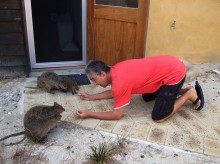 First of all, my apologies that I have not been posting on this blog recently. I’ve been very busy working on the new Recovery Voices project and have been developing the new website with my long-term partner in crime, Ash Whitney from Cilfrew in South Wales.
First of all, my apologies that I have not been posting on this blog recently. I’ve been very busy working on the new Recovery Voices project and have been developing the new website with my long-term partner in crime, Ash Whitney from Cilfrew in South Wales.
Ash and I launched our first website, Daily Dose, back in February 2001 and this was followed by others whilst I was living in the UK. Ash developed this website for me back in 2013 and then The Carrolup Story website for John Stanton and I in 2018. It’s always great fun working with Ash and good to share our interests in sport. Check out Ash’s work at Wired Up Wales.
I’ve been thrilled working with Wulf Livingston of North Wales on the Recovery Voices project. We’ve both been interviewing various people in the recovery field and I’ve been doing a great deal of film editing. Some of you will have seen some of the work we’ve been doing with our collaborators in my blog posts and our Recovery Voices page.

 ‘Recovery Rising is the professional memoirs of William (Bill) L White who, over the span of five decades, evolved through several diverse roles to emerge as the addiction fields preeminent historian and one of its most visionary voices and prolific writers.’
‘Recovery Rising is the professional memoirs of William (Bill) L White who, over the span of five decades, evolved through several diverse roles to emerge as the addiction fields preeminent historian and one of its most visionary voices and prolific writers.’ Yes, I had an exciting 24-hour period during the week, recovery-wise. A couple of weeks ago I contacted Alexandra Magson of North Wales Recovery Communities (NWRC) after she liked a Facebook post I made about a film clip on this website of NWRC’s Founder, James Deakin. She said she would be coming to Perth in two weeks. I assumed she was going to visit Perth, in Scotland, but she said no, she would be in Western Australia. We agreed to meet.
Yes, I had an exciting 24-hour period during the week, recovery-wise. A couple of weeks ago I contacted Alexandra Magson of North Wales Recovery Communities (NWRC) after she liked a Facebook post I made about a film clip on this website of NWRC’s Founder, James Deakin. She said she would be coming to Perth in two weeks. I assumed she was going to visit Perth, in Scotland, but she said no, she would be in Western Australia. We agreed to meet. In a
In a  My second interview with James Deakin, Founder of North Wales Recovery Communities (NWRC), took place on 16 June 2023. It involved Perth, Western Australia, linking up with Bangor, North Wales, on Zoom, with a seven-hour time difference. I edited
My second interview with James Deakin, Founder of North Wales Recovery Communities (NWRC), took place on 16 June 2023. It involved Perth, Western Australia, linking up with Bangor, North Wales, on Zoom, with a seven-hour time difference. I edited  In an interview with my Recovery Voices colleague Wulf Livingston, he talks about his early hedonistic drug and alcohol use, life as a successful chef, and qualification as a social worker. He then worked with the drug and alcohol charity Lifeline, the drug treatment charity CAIS in North Wales, and the Probation Service.
In an interview with my Recovery Voices colleague Wulf Livingston, he talks about his early hedonistic drug and alcohol use, life as a successful chef, and qualification as a social worker. He then worked with the drug and alcohol charity Lifeline, the drug treatment charity CAIS in North Wales, and the Probation Service. Here is an
Here is an  Here’s some powerful writing from one of our bloggers on Wired In To Recovery when it was running between 2008 and 2012.
Here’s some powerful writing from one of our bloggers on Wired In To Recovery when it was running between 2008 and 2012.